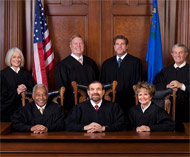10/22/2014
Nevada Supreme Court Strikes Down Forced Motorist Blood Draw LawForced blood draw for suspected driving under the influence of marijuana rejected by Nevada Supreme Court.

Nevada on Thursday became one of a growing number of states backing off from the practice of drawing blood from motorists by force in light of the US Supreme Court's McNeely decision (view case). The high court forced states to reconsider past rulings that held the natural dissipation of alcohol in the bloodstream automatically constituted an "exigent circumstance" that allowed police to forgo obtaining a warrant before forcefully drawing a motorist's blood.
The Nevada Supreme Court struck down as unconsitutional a part of the state's implied consent law through its review of the case of Michael Dwayne Byars. Nevada Highway Patrol Trooper William Murwin had been running over a speed trap on US Highway 50 in Churchill County on January 12, 2012 when he pulled Byars over.
Standing at the driver's side window, Trooper Murwin smelled marijuana, and Byars admitted to smoking a joint five hours before. Byars was arrested for driving under the influence (DUI), and a handgun was found when his car was searched.
Byars was taken to the hospital where he struggled against having his blood taken. For resisting the blood draw, he was charged with a felony "battery by a prisoner in lawful custody," which was added to the felony firearms charge. Nevada's justices found, in light of the US Supreme Court's directive, that the warrantless search was not justified in this case.
"Although McNeely involves alcohol intoxication and this case involves marijuana, we conclude that the reasoning of McNeely applies here and that, like the natural dissipation of alcohol, the natural dissipation of THC from the blood does not create a per se exigency," Justice Ron D. Parraguirre wrote for the court. "Looking to the totality of the circumstances, we conclude that the state failed to establish exigent circumstances to justify the warrantless blood draw."
Trooper Murwin had waited 30 minutes for a drug dog to arrive to conduct a search for drugs, and the trip to the hospital was a "lengthy process." The judges saw no urgency in the trooper's actions that suggest he was unable to contact a judge to obtain a warrant.
Nevada's implied consent statute allows a police officer to use "reasonable force" to take blood from a driver upon the mere belief that the driver may be drunk or stoned.
"The state's argument that consent is valid based solely on Byars' decision to drive on Nevada's roads is problematic because the statute makes the implied consent irrevocable," Justice Parraguirre wrote. "A necessary element of consent is the ability to limit or revoke it."
Rather than allow Byars to go free, the court applied the "good faith" exception. Since the police were following Nevada law, the court reasoned that it would serve no deterrent purpose to suppress the evidence in this case. The conviction was upheld.
A copy of the decision is available in a 250k PDF file at the source link below.


